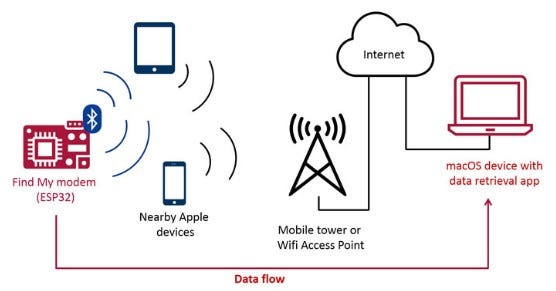AirPods as Spy Gear: How Stalkers and Thieves Can Track and Eavesdrop on You
AirPods Security Alert: How Your Wireless Earbuds Can Be Weaponized Against You
Apple’s AirPods have revolutionized the way we listen to music, take calls, and interact with technology. Their seamless pairing with Apple devices, crisp sound quality, and the ingenious Find My network (that lets you locate your earbuds anywhere) have made them a must-have accessory for millions. But beneath this layer of convenience lies a troubling reality. The very features that make AirPods so useful can also be exploited for surveillance, stalking, theft, and even corporate espionage. 👁🗨
What was designed to help you recover misplaced earbuds can, in the wrong hands, become a powerful tool to track your every move and eavesdrop on your conversations, all without your knowledge. 👀
A Real-World Threat You Might Not Expect
Imagine that you’re sitting in a bustling airport coffee shop, engrossed in your work or reading a book. A stranger brushes past you, and without you noticing, slips an AirPod into your open bag or coat pocket. At that moment, your privacy is compromised. 😵
Using Apple’s Find My network, the person who planted the AirPod can now track your location in real time. But it doesn’t stop there. If they have the technical know-how, they might remotely activate the AirPod’s microphone, turning it into a covert listening device that captures your private conversations. 🐱👤
This scenario may sound like something out of a spy thriller movie or book, but it’s very real. Security researchers have demonstrated how AirPods can be weaponized as tracking and spying tools, and there are documented cases where such misuse has occurred.
How AirPods Can Secretly Track You 🛰
1. The Find My Network is Designed for Recovery, but can be Exploited for Surveillance
Apple’s Find My system is a brilliant piece of technology that helps users locate lost devices by anonymously pinging nearby Apple gadgets (iPhones, iPads, Macs) to report the location of a missing item. When you lose your AirPods, any Apple device passing nearby can detect them and send their location back to you, however, this system has a critical flaw.
Any AirPod can be tracked by its registered owner, even if it’s hidden in your bag, car, or coat pocket.
a) Unlike AirTags, which now alert users if an unknown tracker is moving with them, AirPods do not trigger automatic alerts when they’re traveling with someone who isn’t their owner.
b) AirPods don’t emit a warning sound when they’re in motion, unlike AirTags that beep after several hours to alert nearby people.
This means that someone can slip an AirPod into your belongings and track your movements without you ever knowing.
Real-World Risks of Tracking 📡
Stalking: An abusive partner could hide an AirPod in their victim’s purse or jacket to monitor their whereabouts and movements. 😬
Theft: A thief might slip an AirPod into a luxury car to track when the owner is away, planning a break-in or theft. 🤯💨
Corporate Espionage: A competitor could plant AirPods in a conference room or office to secretly listen in on private meetings and confidential discussions. 😱
2. How Easy Is It to Plant a Tracking AirPod? 🧐
Physically, it’s surprisingly simple. AirPods are small, lightweight, and can be easily concealed in a handbag, jacket pocket, or even taped underneath a desk or chair. Because they’re wireless and don’t require any power source beyond their built-in battery, they can remain hidden and functional for hours. 😵
Digitally, if an attacker manages to briefly pair their AirPods with your phone, let’s say, at a public charging station or while you’re distracted - they could potentially maintain a connection that allows them to track or eavesdrop on you remotely.
Eavesdropping: When AirPods Become Hidden Spy Microphones 👨💻
1. Bluetooth Vulnerabilities in AirPods
Security researchers have uncovered several vulnerabilities in AirPods, especially older models (1st and 2nd generation), that make them susceptible to hacking:
Bluetooth Spoofing: Attackers can impersonate trusted devices to hijack the connection and silently activate the AirPods’ microphones.
Persistent Microphone Activation: Some early AirPods models keep the microphone active even when they appear to be “off” or disconnected.
Silent Pairing Attacks: Hackers can exploit Bluetooth protocols to connect to your iPhone or AirPods without your knowledge, gaining access to audio streams.
Now let me introduce you a hacking experiment that was done in 2022 by a security researcher proving that AirPods can be a security risk vector. 👇
The "AirPod Bug" Attack (2022)
In a widely publicized demonstration, a security researcher exploited a Bluetooth flaw to:
→ Remotely connect to AirPods within Bluetooth range. (10-30m)
→ Activate the microphone to listen in on conversations happening nearby.
→ Stream the audio in real time to a separate device controlled by the attacker.
While Apple has addressed many of these vulnerabilities in firmware updates, older AirPods that haven’t been updated remain at risk. ✋
2. How an Attacker Could Spy on You 👇
How to Detect and Stop Unauthorized AirPods
1. Enable "Unknown Tracker Alerts" (iOS 17.5+) ✔
Apple has recently introduced alerts for unknown Bluetooth trackers, including AirPods, similar to the alerts Android users have had for a while.
How to Enable: Go to Settings > Privacy & Security > Safety Check and turn on Notify When Left Behind for your AirPods.
Important Limitation: This alert only triggers if the AirPod is separated from its registered owner - it does not alert you if someone is actively tracking you by carrying the AirPod with them. 🛑
2. Manually Check the Find My App for Strange Devices 📑
Open the Find My app and tap on Devices.
Look for any unfamiliar AirPods or Bluetooth devices.
If you spot one, tap it and select Remove This Device to disconnect it from your Apple ID.
3. Disable Automatic Pairing 🔒
Go to Bluetooth Settings, tap the (i) icon next to your AirPods, and toggle off Automatic Ear Detection.
This prevents rogue AirPods from silently connecting to your device without your knowledge.
4. Keep Your AirPods Firmware Updated 🔗
Place your AirPods in their charging case, connect them to your iPhone, and charge both devices.
Apple pushes firmware updates automatically during charging, which patch security vulnerabilities.
Running outdated firmware increases your risk of being exploited.
5. Physical Inspection 🔎
Regularly check your bags, pockets, car, and personal spaces for unexpected AirPods.
If you find one, reset it by holding the case button for 15 seconds to sever the connection to its owner.
Why Apple’s Safeguards Aren’t Enough 🙅♂️
Despite Apple’s efforts to improve security, significant gaps remain:
Unlike AirTags, AirPods don’t proactively alert you when an unknown device is nearby.
Older AirPods still have Bluetooth vulnerabilities that can be exploited.
The Find My network operates on an opt-out basis, meaning any Apple device can unknowingly assist trackers by reporting locations.
What Apple Should Do 👨🏫
Implement AirPod tracking alerts as robust as those for AirTags.
Add a physical pairing switch or confirmation step to prevent silent connections.
Encrypt Bluetooth audio streams end-to-end to block unauthorized eavesdropping.
Until these measures are in place, users must take privacy into their own hands. 🤞
Let’s talk about Convenience vs. Security 🛡
AirPods are undeniably brilliant devices that enhance our daily lives. But their very convenience can be turned against us, enabling stalking, theft, and spying with frightening ease.
By enabling alerts, vigilantly checking for unknown devices, and keeping firmware up to date, you can reduce your risk. However, the ultimate responsibility lies with Apple to strengthen protections and close loopholes in their ecosystem.
If you use AirPods, take a moment today to check your settings and update your firmware. It’s a small effort for a big boost in security.
In the meantime, awareness and proactive security habits are your best defense against turning your AirPods into a tool for someone else’s surveillance.










Yikes! I only use wired earbuds, but I think I’ll stick a piece of tape over the mic-holes in my Oontz Angle BT speakers! TYVM Mark.